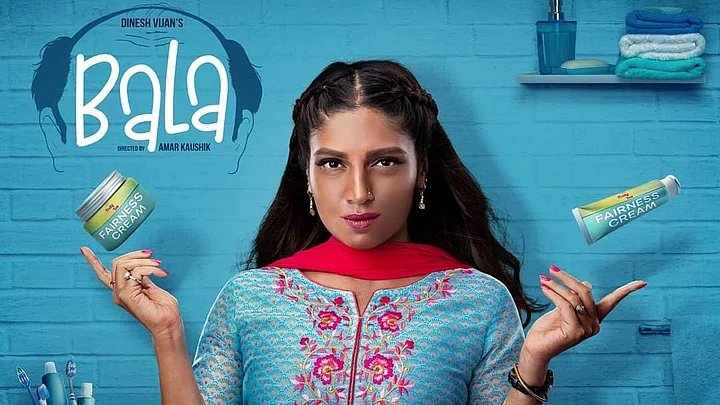One of the most impactful moments of Amar Kaushik’s Bala occurs in the first five minutes of the film: when a young boy named Balmukund Shukla (who later becomes Ayushmann Khurrana) publicly shames a young girl named Latika for her dark complexion. The scene sets precedent for what’s to come. An Ayushmann-style tale of self-acceptance which shoves a social message down your throat. But despite Bala’s obsession with hair (both the character and the film) and the moral lesson that comes attached with it, the film doesn’t land quite as effectively as you’d expect it to. Unfortunately, Bala’s message of self-acceptance is beaten down by Bhumi Pednekar’s uncomfortable and objectively bad brownface (or should I say blackface) makeup.
Bhumi’s Character Falls Flat
Bala’s grown-up Latika is played by Bhumi Pednekar — an actor who is nowhere close to having a dark skin tone. Naturally, her face has been painted several shades darker to the point that she comes across as a spoof-version of the adolescent Latika we met in the beginning. Bhumi’s onscreen presence is jarring, not just because of the unnaturally darkened skin tone but also because of the inconsistent makeup. Latika’s dark skin is presented to us in varying shades throughout the film.
Now, Bollywood has always had a blackface problem. We’ve seen the usage of blackface/brownface to depict characters that belong to lower socio-economic backgrounds — think Alia Bhatt in Udta Punjab and Gully Boy’s Ranveer Singh. And perhaps that’s Bala’s only saving grace here; that it uses its character’s dark skin not to segregate but to convey a social message. Latika is a woke Kanpur-based lawyer who has always been discriminated against and shamed for her dark skin tone. She not only accepts herself but also demands acceptance from society.
So if the filmmakers wanted to get everything so right (and they almost did!), why couldn’t they cast an actor with a naturally dark skin tone to play the role?
Evolution of Representation
In the recent past, representation has become a crucial lens through which cinema is analysed and Bhumi seems to have found herself on the wrong side of the debate. In 1985, when 29-year-old Anupam Kher played a character that was more than twice his age in Saaransh, he was applauded for his award-winning performance. But when Bhumi (and Taapsee Pannu) went down the same path in Saand Ki Aankh, she found herself amidst an unexpected controversy. Kubra Sait’s commendable performance as a transperson in Netflix’s Sacred Games too was received with much criticism.
But when we speak of ‘authentic representation’, do we also include Ayushmann Khurrana’s Bala? Do we attempt to pull him up for playing a bald character even though he’s not actually bald? Some may like to but in reality it would be unfair to sort ‘bald men’ in the same category as that of other marginalised groups that have been mistreated by society for generations. Truth remains that society will always be kinder to a bald man as compared to a bald woman. In fact, there are studies that show the acceptance of male baldness as a symbol of power and masculinity.
Bhumi’s misplaced casting in Bala points towards an issue that’s much bigger and is not merely a numbers game. When Priyanka Chopra was cast to play a Manipuri boxer in Mary Kom, there was some conversation about authentic representation yet again. One could argue that Priyanka was cast to achieve a wider reach for the film and there just happened to not be enough mainstream Northeastern actors in the industry.
Now even if one were to keep aside the discrimination against the Northeast region and briefly consider that argument to defend Bhumi’s casting, it still doesn’t hold true. Latika might check all the right boxes, but she’s still embarrassingly one-dimensional.
Bhumi’s character is purely a plot point in ‘Bala’ with the sole intention of helping Ayushmann realise his own problem.
Sadly, Latika’s ugliness is just a tool for Bala’s self-actualisation and serves no bigger purpose. But that’s probably a whole other story.
Bollywood’s Obsession With Fairness
If the makers wanted, they could very easily cast someone lesser-known with a naturally dark skin tone as Latika. But they just didn’t because Hindi cinema simply has no space for a woman who isn’t fair. This obsession with fairness is more severe and definitely worse than the obsession with hair portrayed in Bala. We’ve only ever seen a handful of mainstream female actors, who don’t match the accepted skin tone norm, achieve stardom. And even then, their success has been limited and brief.
Actors like Konkona Sen Sharma and Bipasha Basu, who have been labelled as some of the few Bollywood actors with ‘dusky complexion’, have virtually disappeared from mainstream Hindi cinema. Nandita Das’ filmography consists predominantly of films that are less mainstream. In an interview with The Quint, Newton actor Anjali Patil opened up about the lack of opportunities and discrimination she has had to face on account of not having a fair complexion.
Even Priyanka Chopra, who is today a global icon, seems to have become progressively less duskier with fame (and time).
Bollywood is an industry that is generally unkind to women. So for an actor like Bhumi Pednekar to accept a role that clearly did not belong to her is definitely wrong. But, just like Latika in Bala, is the onus to fix the wrong in society always on women only?
(At The Quint, we question everything. Play an active role in shaping our journalism by becoming a member today.)
